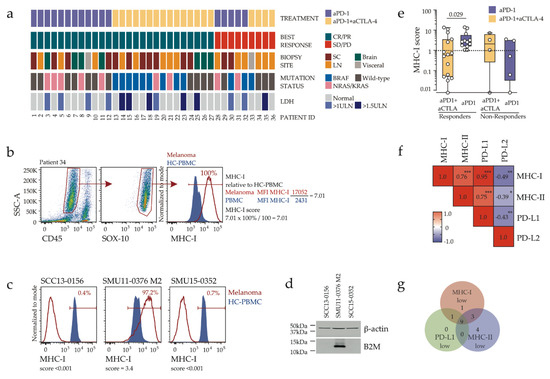Cancers, Vol. 12, Pages 3374: Tumor MHC Expression Guides First-Line Immunotherapy Selection in Melanoma
Cancers doi: 10.3390/cancers12113374
Authors: Elena Shklovskaya Jenny H Lee Su Yin Lim Ashleigh Stewart Bernadette Pedersen Peter Ferguson Robyn PM Saw John F Thompson Brindha Shivalingam Matteo S Carlino Richard A Scolyer Alexander M Menzies Georgina V Long Richard F Kefford Helen Rizos
Immunotherapy targeting T-cell inhibitory receptors, namely programmed cell death-1 (PD-1) and/or cytotoxic T-lymphocyte associated protein-4 (CTLA-4), leads to durable responses in a proportion of patients with advanced metastatic melanoma. Combination immunotherapy results in higher rates of response compared to anti-PD-1 monotherapy, at the expense of higher toxicity. Currently, there are no robust molecular biomarkers for the selection of first-line immunotherapy. We used flow cytometry to profile pretreatment tumor biopsies from 36 melanoma patients treated with anti-PD-1 or combination (anti-PD-1 plus anti-CTLA-4) immunotherapy. A novel quantitative score was developed to determine the tumor cell expression of antigen-presenting MHC class I (MHC-I) molecules, and to correlate expression data with treatment response. Melanoma MHC-I expression was intact in all tumors derived from patients who demonstrated durable response to anti-PD-1 monotherapy. In contrast, melanoma MHC-I expression was low in 67% of tumors derived from patients with durable response to combination immunotherapy. Compared to MHC-I high tumors, MHC-I low tumors displayed reduced T-cell infiltration and a myeloid cell-enriched microenvironment. Our data emphasize the importance of robust MHC-I expression for anti-PD-1 monotherapy response and provide a rationale for the selection of combination immunotherapy as the first-line treatment in MHC-I low melanoma.



Δεν υπάρχουν σχόλια:
Δημοσίευση σχολίου
Σημείωση: Μόνο ένα μέλος αυτού του ιστολογίου μπορεί να αναρτήσει σχόλιο.